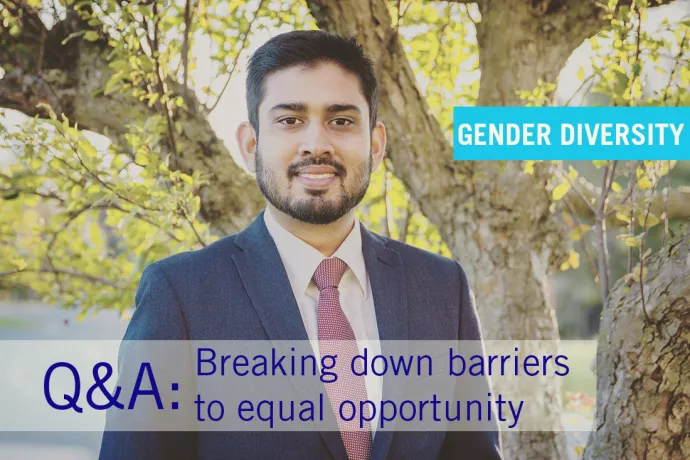
A committed professional in the field of corporate sustainability management, Ayman Chowdhury is well-versed when it comes to issues surrounding gender diversity and inclusion in the corporate workplace.
“His passion for the gender empowerment cause is genuine and deep,” said Professor Soo Min Toh, the incoming Director of the Institute for Management & Innovation and Chowdhury’s research supervisor. “Ayman is a student who goes above and beyond in all he does and is driven by a deep sense of belief in making a positive difference in the world.”
Before pursuing the Master of Science in Sustainability Management (MScSM) at the University of Toronto, Chowdhury worked for an international management consulting firm based in Bangladesh, writing proposals and managing sustainable development projects funded by multilateral and bilateral agencies including the World Bank, the Asian Development Bank, Japan International Cooperation Agency, and the United Nations Development Program.
Recently, he joined the Global Compact Network Canada (GCNC), the Canadian Network of the United Nations Global Compact (the world’s largest voluntary corporate sustainability initiative), as a Senior Consultant. In April, he was invited to moderate a panel at the Gender Equality Forum 2017 in Toronto. Organized by Global Compact Network Canada in collaboration with UN Global Compact and UN Women, and hosted by Deloitte Canada, the event explored barriers to women’s economic empowerment.
What was the panel discussion about?
My panel discussion session was titled, “Equal Opportunity: Inclusion and Non-discrimination in the Workplace.” It focused on showcasing the corporate policies and practices as they pertain to recruitment, retention practices, and gender sensitivity. The discussion also included innovative decision-making processes to excel in these areas.
What are some valuable insights you've garnered during this experience?
The biggest hurdle is to find the systemic barriers within the organization that may be unintentionally keeping women out of deserving positions. However, there are things that can be done. For instance, one panelist suggested that we need to make a conscious effort to identify and recognize biases within ourselves. It is also important for organizations to do a thorough audit of their talent processes to ensure that such biases are removed as much as possible.
The commitment should come from top management and the change should be reflected in company values. The Women’s Empowerment Principles (WEPs), a collaboration between the UN Global Compact and UN Women, help companies to initiate such a change. It offers guidance on how to empower women in the workplace, marketplace and community from establishing strong policies to building supply-chain practices.
Why should women’s empowerment be a man’s prerogative?
Sustainability is not only about saving the environment; it is also about shaping society and the economy in a well-balanced and well-governed structure. Hundreds of studies suggest that the achievement of full human potential and of sustainable development is not possible if one half of humanity continues to be denied its full human rights and opportunities.
Women and girls must enjoy equal access to quality education, economic resources and political participation as well as equal opportunities with men and boys for employment, leadership and decision-making at all levels. As much as this is a concern for women, it should not be any less of one for a man.
What are the benefits of gender diversity in the workplace?
Gender diversity and women’s empowerment are not and should not be considered as an act of empathy. It’s simply good for business and good for society. The Global Gender Gap Report 2016 prepared by the World Economic Forum highlights that, “empowering women means a more efficient use of a nation’s human capital endowment and that reducing gender inequality enhances productivity and economic growth.” When countries achieve gender equality it also gives the country an opportunity to “maximize its competitiveness and economic potential.”
How does Canada rank?
Canada has enormous potential but somehow the resources are being overlooked or not being utilized properly. Globally, Canada ranks at the top when it comes to ensuring education for women. However, Canada performs relatively poor in terms of ensuring economic and political empowerment, and health and safety for women. This has resulted in Canada only securing the 35th spot in the overall ranking in the Global Gender Gap. Clearly, Canada is not professionally nurturing its talented female workforce.
The good news is that things are improving. We are seeing a lot of commitments and initiatives from federal and provincial governments these days. I am very hopeful that Canada will soon establish itself as a leader in the world for gender equality as this is the right thing to do for both the economy and society.
*Story by Sarah Jane Silva. Photo provided by Ayman Chowdhury for the Institute for Management & Innovation.
